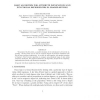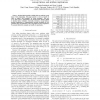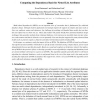5 search results - page 1 / 1 » Fuzzy Attribute Implications: Computing Non-redundant Bases ... |
AUSAI
2005
Springer
14 years 10 days ago
2005
Springer
Abstract. This note describes a method for computation of non-redundant bases of attribute implications from data tables with fuzzy attributes. Attribute implications are formulas ...
IJFCS
2008
13 years 6 months ago
2008
We present GLinClosure, a graded extension of the well-known LinClosure algorithm. GLinClosure can be used to compute degrees of semantic entailment from sets of fuzzy attribute i...
CLA
2006
13 years 8 months ago
2006
We present graded extension of the algorithm LinClosure. Graded LinClosure can be used to compute degrees of semantic entailment from sets of fuzzy attribute implications. It can a...
IRI
2006
IEEE
14 years 25 days ago
2006
IEEE
— Maximal full rectangles in tabular data are useful in several areas of data engineering. This paper presents a survey of results in which we replace “full rectangles” by �...
SBBD
2004
13 years 8 months ago
2004
Multi-valued dependencies (MVDs) are an important class of constraints that is fundamental for relational database design. Although modern applications increasingly require the su...



